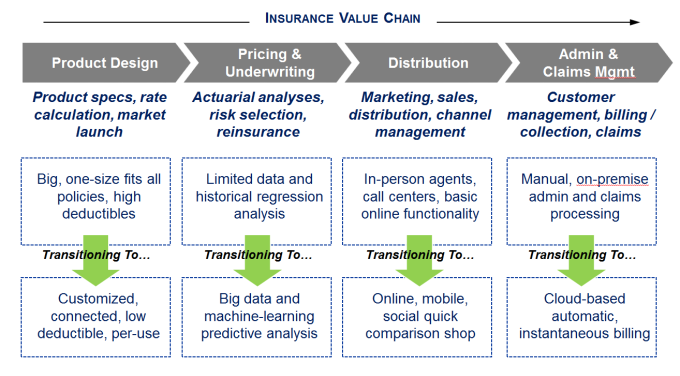
- Opportunities In The Risk Business Abound As Insurance Is Ready For Disruption

Timing is everything and the industry is finally on the brink of transformative change, driven by strong secular trends. The world is online and connected — creating new distribution channels but also new risk (e.g., cybersecurity). Additionally, explosion of the shared economy and 1099 workers has created fractional ownership — and with it, uncertainty around who bears the risk.
- WHY USING YOUR POWER IN A NEGOTIATION ISN’T ALWAYS A GOOD IDEA
For example, in 2007, Wal-Mart used its power as the largest retailer of consumer goods in the United States to require the makers of liquid detergents to compact their formulas. Making detergents more concentrated was valuable to Wal-Mart, because it would save shelf space, but it would also decrease shipping costs across the supply chain. Indeed, they announced this initiative for the first time at the Clinton Global Initiative. They achieved their goal of selling only concentrated detergents by 2008.
Detergent manufacturers resisted this request at first, because there was a substantial research and development effort required by manufacturers to find a concentrated formula that would work effectively. They only undertook this development work because of the pressure from Wal-Mart, who would no longer carry detergents at their original concentration after a specified date.
Moral of the story: Walmart got exactly what it wanted… they just made it seem like it was good for everyone
http://www.fastcompany.com/3056079/hit-the-ground-running/why-using-your-power-in-a-negotiation-its-always-a-good-idea - Being a Go-Getter Is No Fun
The counter-point to this is… go ahead an bury your head in the sand and be like everyone else, you will still be in the same position as them 10 years from now.“In the workplace, managers should be careful to give the highest quality work and best opportunities to the most capable employees, and give the lower quality but time consuming work to less capable employees,” says Koval. “If someone is doing more than his fair share, compensate him for it. If not, he may ultimately leave and seek recognition elsewhere. Similarly, in our personal relationships, we should recognize that just because our high-ability partners can do something for us, doesn’t mean that we should let them. And if they do help us, we should recognize it and thank them for it. Otherwise, they too may end up feeling burdened by us, and less satisfied—and that should be the last thing we want to do to a good employee or a good partner.”
While I disagree somewhat with the premise of the article, the following quote hits home for me:
A separate experiment found that participants not only assigned more tasks to the go-getters—but underestimated how much work it would take to get the job done. “What looks easy from the outside may not feel that easy on the inside,” says Gráinne Fitzsimons, one of the co-authors of the study.
- GE’s Relocation: Great for GE, Not as Great for Boston’s Taxpayers
This was a savvy move by Boston, regardless of the incentives.Unfortunately, that future comes with a stiff price tag. Together, the city and the Commonwealth of Massachusetts offered up an estimated $145 million in business incentives ($120 million in grants and other programs from the state, and another $25 million in property-tax relief from the city) to secure the deal. By my calculations, that means that the city and state are doling out a whopping $181,250 in public subsidies per job, given GE’s own statement that its new headquarters will employ 800 people (200 corporate staff members and another 600 so-called digital industrial product managers, designers, and developers). And that doesn’t even include additional incentives such as grants for workforce training (another $1 million or so), a new “innovation center” designed to better tie GE to local universities and research institutes ($5 million more), assistance for employees to relocate to Boston, and transportation improvements in the Seaport District.
http://www.theatlantic.com/business/archive/2016/01/ge-boston-taxpayers/424938/
- Does PayStream Report on Coupa Really Matter . . . To Anyone?
For far too long in this industry, procurement professionals have sought advice from sources who are the least qualified to answer questions. Or let me put it this way . . . the sources can answer them, but the information that is provided does not often reflect what is truly happening in the real world. The reason has nothing to do with IQ – I had to write this in case anyone protested that I was calling analysts and bloggers dumb – which I am not not.
The reason has more to do with the disconnect between cause and effect. Cause being the advice, and effect being actual client outcomes.
- It’s Time to Quit the ‘Motivation Porn’ and Get Serious About Success
Since this article almost exactly describes my work mentality and how I get thing done, I will share…1. Stop watching so much television. Seriously.
Even if you’re only watching 90 minutes a day before/after work, that’s over 500 hours per year of energy spent on something with literally no return.Yes, there are some great shows. I love House of Cards, Breaking Bad and Game of Thrones. But if we’re being honest, 99 percent of TV sucks. We just watch it because we need to “relax” and we feel like there’s nothing else to do.
This philosophy applies to movies, too. Most of the time, we just watch movies because we feel like there’s nothing better to do. I’ve watched hundreds of movies that, after two hours, simply made me go “meh.” What a waste.
This is empty time when you should be working on your idea. This is the time you have to start plotting your escape.
If there’s a particular show that you really love, block out time for that particular show every week and when it’s over, turn the TV off. When you want it, make it count. If it’s not a “hell yes!” then forget it.

